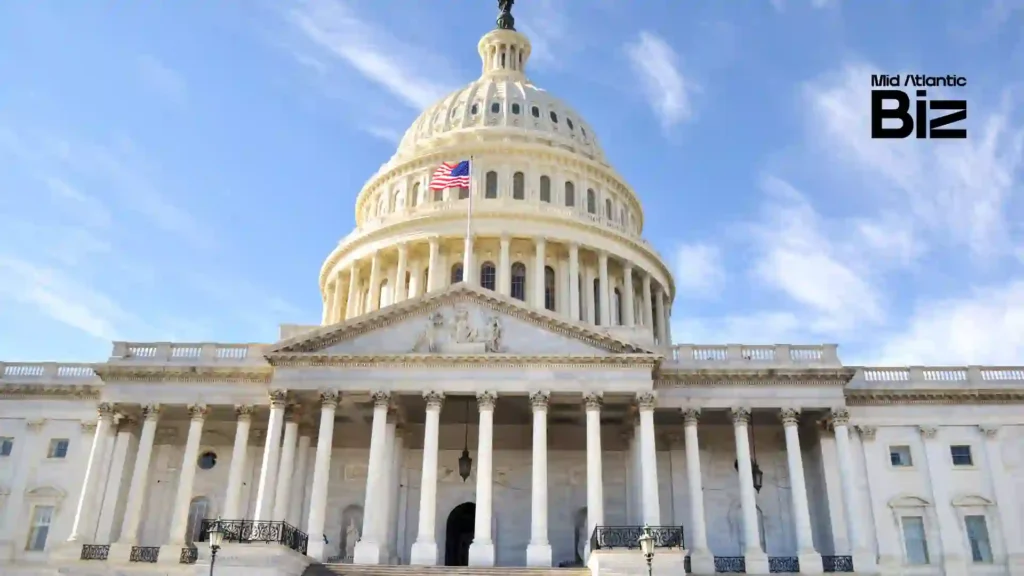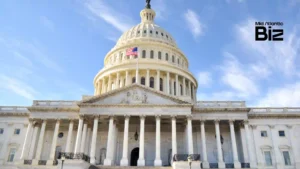
[Mid Atlantic Biz] The political landscape in the United States has recently undergone a significant transformation, ushering in a new administration with fresh priorities and policies. As businesses across the country adapt to these changes, the Mid-Atlantic region, comprising states like New York, New Jersey, Pennsylvania, Delaware, Maryland, Virginia, and Washington, D.C., faces unique challenges and opportunities. This region is an economic powerhouse, housing a diverse array of industries ranging from finance and technology to agriculture and manufacturing. Understanding the potential impacts of the administration’s adjustments is crucial for business leaders and entrepreneurs who aim to remain competitive and drive growth in this evolving environment.
This comprehensive guide dives deep into the policies of the new administration and explores how they will affect Mid-Atlantic businesses, offering actionable insights and strategies to navigate the road ahead. From shifts in economic policies to changes in labor laws and environmental regulations, businesses must prepare to adapt to both opportunities and challenges.
Economic Policies and Taxation: Shaping the Financial Landscape
Economic revitalization stands as a central pillar of the new administration’s agenda, with a strong emphasis on comprehensive tax reforms. These proposed changes aim to stimulate business investment, bolster economic growth, and create a more competitive environment for corporations operating within the U.S. While the reduction in the corporate tax rate is a headline-grabbing proposal, the broader implications of these reforms require careful consideration by businesses in the Mid-Atlantic.
For instance, a lower corporate tax rate could lead to increased profitability for businesses, enabling reinvestment in operations, workforce expansion, and the exploration of new markets. Large corporations based in financial hubs like New York City or manufacturing centers in Pennsylvania may find these changes particularly beneficial, as they provide additional resources for innovation and growth. However, small to medium-sized enterprises (SMEs) must analyze how these reforms might impact them, especially if other adjustments—such as changes to deductions or credits—offset the benefits of lower taxes.
Moreover, the treatment of pass-through entities such as LLCs and partnerships, which are prevalent among Mid-Atlantic entrepreneurs, is likely to be revised. These changes could redefine how profits are taxed, influencing decisions related to business structuring, financial planning, and even hiring strategies. For businesses that rely heavily on seasonal or part-time employees, understanding how new tax implications might affect payroll and operational costs is critical.
It is essential for companies to stay informed about evolving tax policies, consulting with accountants and financial advisors to adapt strategies that align with the new framework. Early preparation and flexible financial planning will be key to navigating these changes successfully.
Trade Policies and International Relations: Navigating a Global Economy
The new administration’s approach to international trade is poised to reshape the global economic landscape. With an emphasis on renegotiating trade agreements, implementing tariffs, and promoting domestic production, the policies aim to prioritize American industries and protect domestic jobs. While this protectionist stance may benefit certain sectors, it could also present significant challenges for businesses in the Mid-Atlantic that rely on global supply chains and export markets.
For example, manufacturing hubs in Pennsylvania and New Jersey that depend on raw materials or components sourced from abroad might experience increased costs due to tariffs. Similarly, businesses that export products to international markets could face retaliatory tariffs, complicating logistics and pricing strategies. To mitigate these risks, companies should explore diversifying their supplier base, investing in domestic sourcing where feasible, and seeking alternative markets to expand their customer base.
At the same time, the administration’s emphasis on “Buy American” policies presents opportunities for businesses that produce goods domestically. Companies in the Mid-Atlantic region should evaluate their eligibility for government contracts and prepare to meet the requirements of federal procurement programs, which may prioritize American-made products. Proactive engagement with local chambers of commerce and trade organizations can provide valuable resources for navigating these opportunities.
In addition to adapting to domestic policies, businesses must also monitor global trade dynamics. Relationships with key trading partners like China, Canada, and the European Union are likely to influence supply chain stability and market access. Staying ahead of these developments will be crucial for maintaining a competitive edge in a rapidly evolving global economy.
Labor and Employment Regulations: Balancing Compliance and Workforce Needs
Labor policies are a cornerstone of any administration’s agenda, and the current leadership is no exception. The Mid-Atlantic region, known for its diverse workforce and vibrant economic sectors, is particularly sensitive to changes in wage laws, labor relations, and employment benefits. Businesses must stay informed about these developments to remain compliant and competitive.
One anticipated change is the potential adjustment of the federal minimum wage. While several states in the Mid-Atlantic, such as New York and Maryland, already have higher minimum wages than the federal standard, an increase could still impact businesses that operate across state lines or rely on entry-level or hourly workers. Employers should assess the financial implications of wage increases and consider strategies to mitigate their effects, such as optimizing workforce productivity, automating repetitive tasks, or revising pricing models.
Healthcare reform is another critical area of concern. Potential changes to the Affordable Care Act (ACA) could redefine employer obligations regarding health insurance coverage. Businesses must prepare for shifts in coverage requirements, premium subsidies, and reporting mandates. For example, small businesses that were previously exempt from certain ACA provisions may find themselves newly accountable under revised regulations. Engaging with industry associations and legal experts can provide valuable guidance on navigating these complexities while ensuring compliance and maintaining employee satisfaction.
In addition, changes to overtime regulations, family leave policies, and union relations are on the horizon. Businesses should proactively review their employment practices, update HR policies, and train management teams to adapt to these regulatory shifts. Open communication with employees about these changes will also be essential for maintaining trust and morale.
Infrastructure Development: Opportunities for Growth and Investment
One of the most ambitious goals of the new administration is to revitalize the nation’s infrastructure, which has long been a point of contention. The Mid-Atlantic region, with its aging transportation networks, bridges, and public transit systems, stands to benefit significantly from these proposed investments. For businesses, this presents both direct and indirect opportunities for growth and innovation.
Construction, engineering, and related industries are likely to see a surge in demand as government contracts for infrastructure projects become available. Businesses in these sectors should position themselves to capitalize on these opportunities by ensuring compliance with bidding requirements, building partnerships with local governments and contractors, and investing in the workforce and equipment needed to meet increased demand.
Beyond construction, other businesses can benefit from improved infrastructure as well. Enhanced transportation networks can reduce delivery times, lower logistical expenses, and provide easier access to markets. For retailers and manufacturers, these improvements can lead to more efficient supply chains and increased profitability. Additionally, better public transit systems can expand the talent pool for employers by making commuting more accessible for workers in suburban and rural areas.
Infrastructure investment also has the potential to stimulate economic activity in underdeveloped areas, creating new opportunities for businesses to establish a presence in emerging markets. Entrepreneurs and investors should keep a close eye on regional development plans to identify areas of growth and align their strategies with these trends.
Environmental Regulations: Adapting to Changing Standards
The administration’s approach to environmental regulations represents a notable shift from the stringent policies of previous years. While this shift may alleviate compliance burdens for certain industries, it also raises concerns about long-term sustainability and corporate responsibility.
For energy-intensive businesses in the Mid-Atlantic, such as manufacturing and logistics, relaxed regulations could lower operational costs by reducing compliance expenses. However, companies with strong commitments to environmental stewardship may face challenges aligning their sustainability goals with the evolving regulatory landscape. To maintain their reputation and meet stakeholder expectations, businesses should continue investing in energy-efficient technologies, renewable energy sources, and sustainable practices.
Furthermore, industries such as renewable energy and environmental consulting may experience changes in market dynamics. While federal support for green initiatives might wane, state governments in the Mid-Atlantic, such as New York and Maryland, are likely to continue pursuing ambitious renewable energy targets. Companies operating in these sectors should align their strategies with state-level policies to leverage growth opportunities.
Adapting to Political Uncertainty: Staying Resilient
Political transitions often bring uncertainty, and this administration is no exception. Businesses in the Mid-Atlantic must remain agile and proactive in responding to policy changes that affect their operations, workforce, and markets.
Engaging with industry associations, chambers of commerce, and policymakers can provide valuable insights and advocacy opportunities. By participating in these networks, businesses can influence policy decisions, share best practices, and access resources to navigate challenges effectively. Additionally, scenario planning is essential for preparing for a range of potential outcomes. By identifying risks and opportunities associated with different policy scenarios, businesses can develop contingency plans and allocate resources strategically.
Conclusion: Thriving in a Changing Landscape
Navigating the new administration’s policies requires Mid-Atlantic businesses to remain informed, adaptable, and forward-thinking. Whether it’s tax reforms, trade policies, labor regulations, or infrastructure investments, understanding the implications of these changes is crucial for long-term success.
By staying engaged with policy developments, leveraging opportunities for growth, and aligning strategies with evolving priorities, businesses in the Mid-Atlantic region can thrive in a dynamic political and economic environment. Collaboration, innovation, and resilience will be the keys to turning challenges into opportunities and ensuring sustained growth in the years to come.












